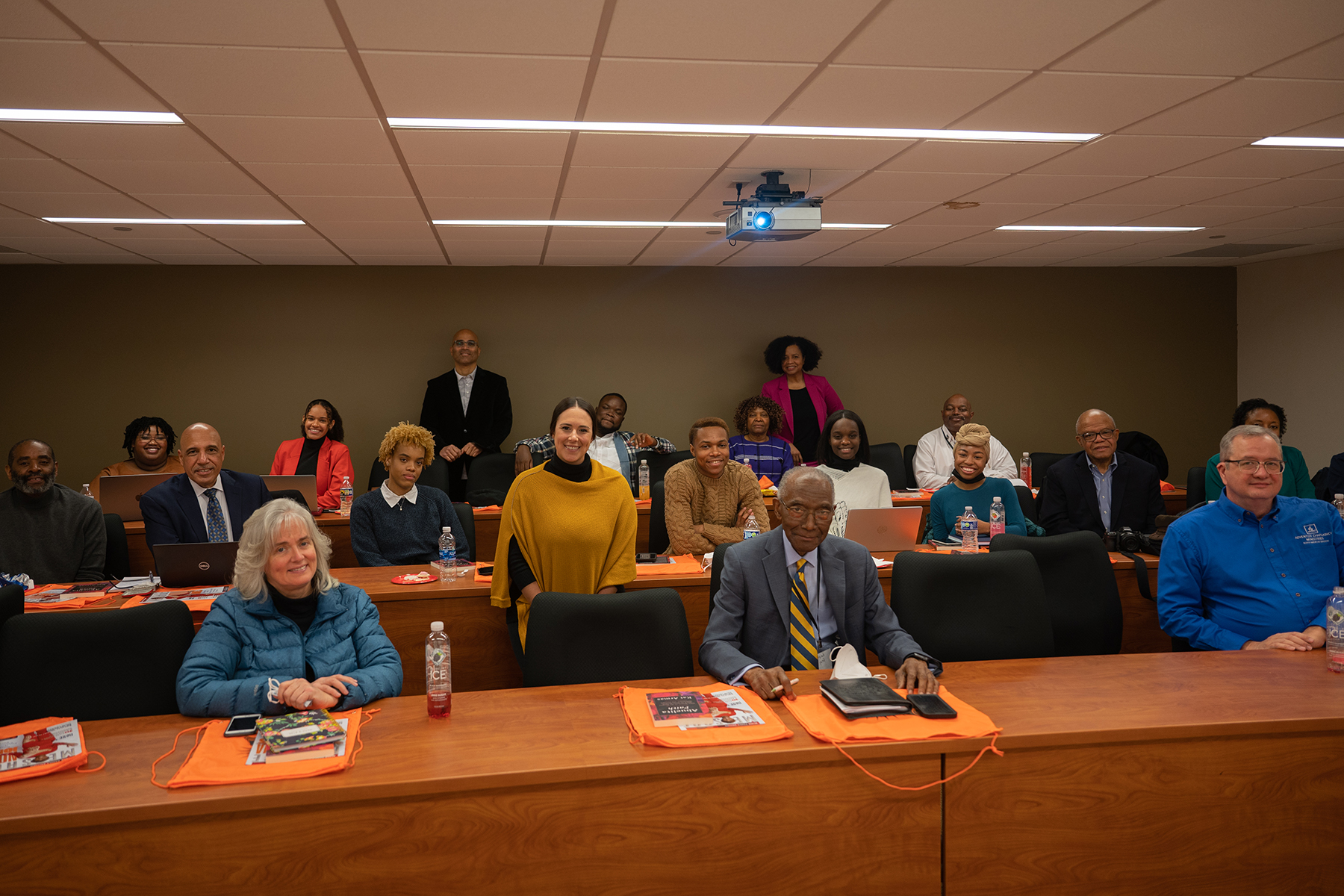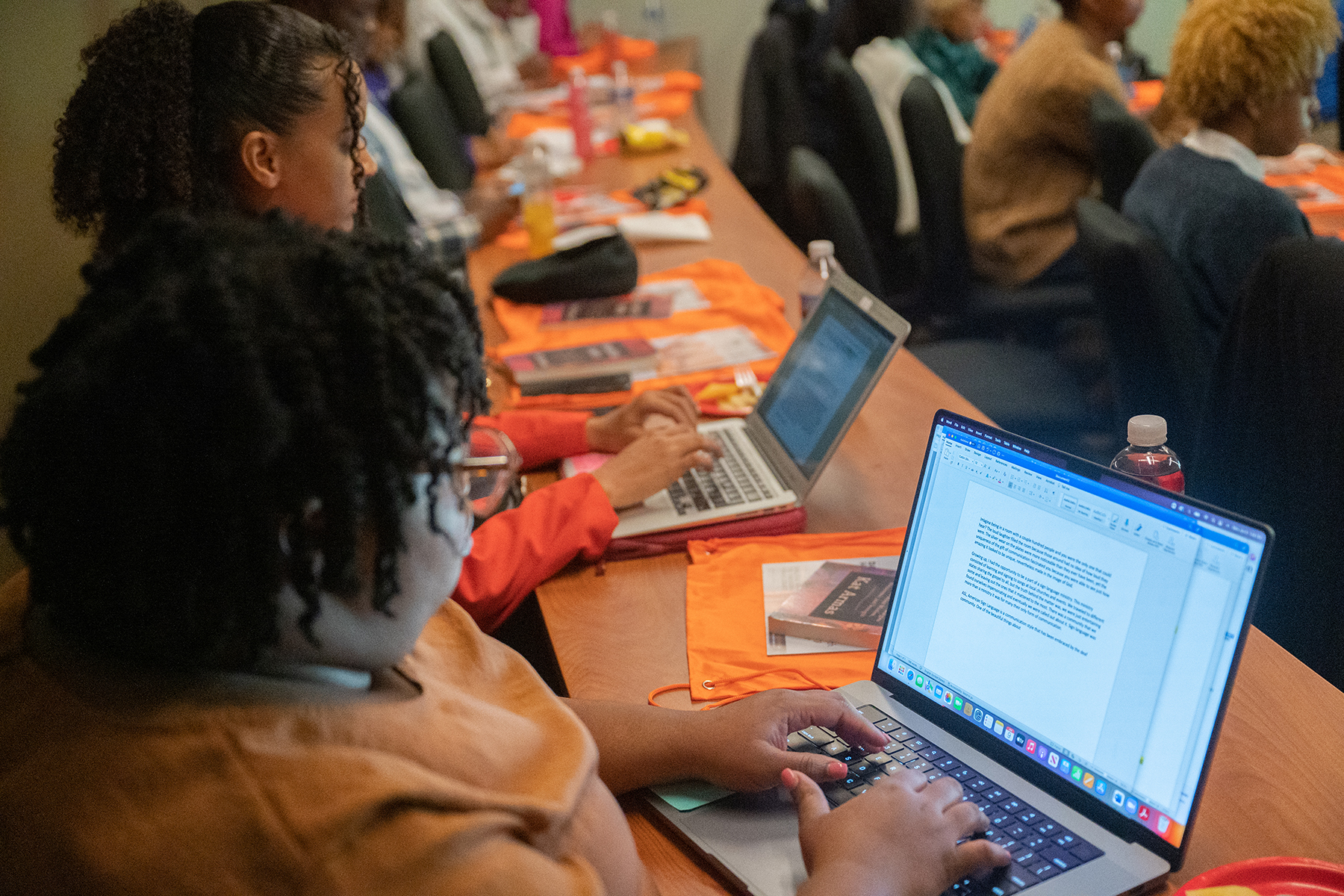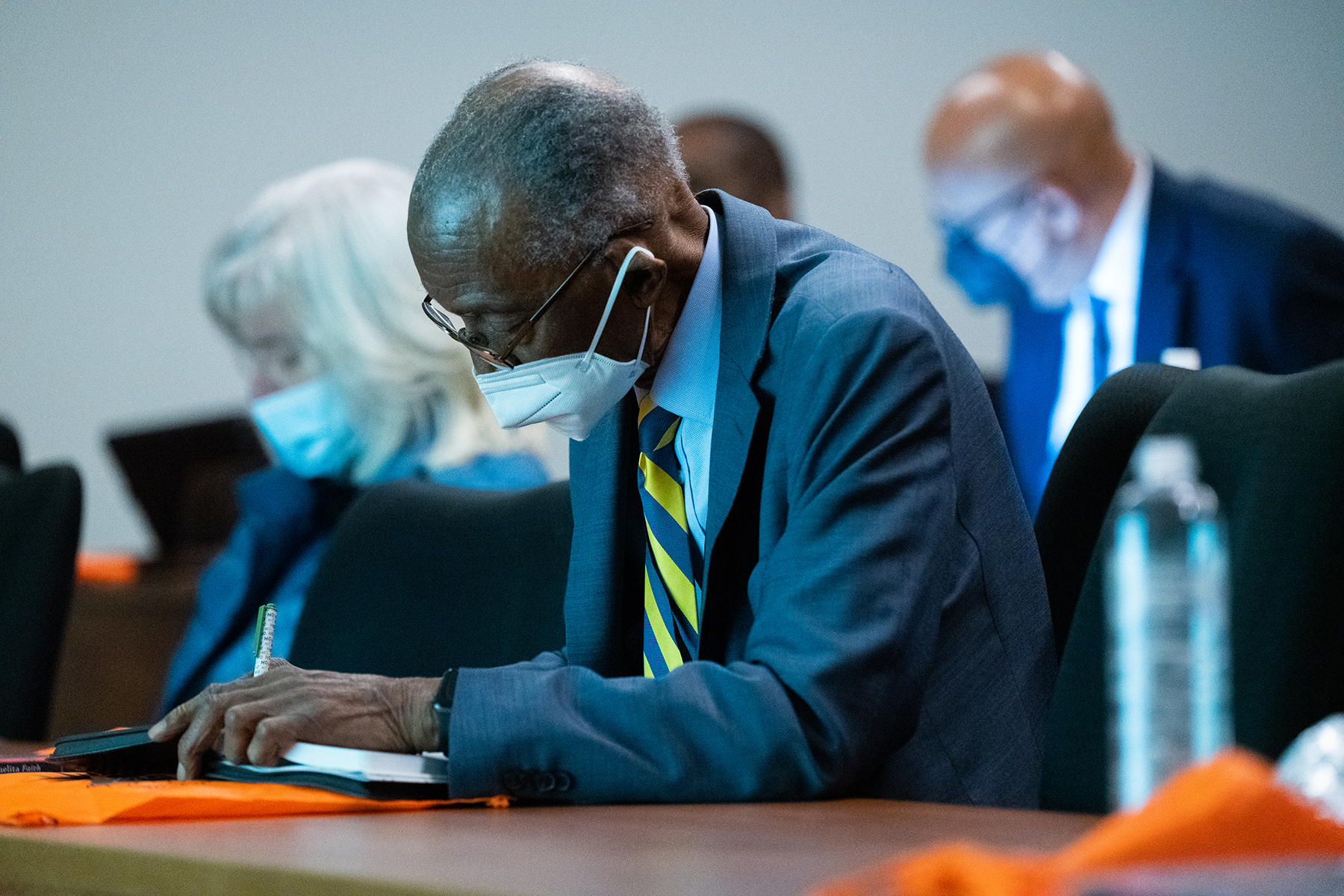
Participants of the North American Division's (NAD's) counternarrative writing conference [standing, front row - speaker Kat Armas, author of Abuelita Theology, and back row, Carl McRoy, NAD Literature Ministries director (l) and Carmela Monk Crawford, Message magazine editor (r)]. It was held January 9 & 10, 2023, as part of the NAD's Adventist Ministries Convention. The conference was held at the site of the International Civil Rights Center in Greensboro, North Carolina. Photo by Bryant Taylor
On February 1, 1960, four well-dressed young Black men, freshmen at North Carolina Agricultural and Technical (A&T) College, sat down at a segregated Woolworth’s lunch counter in Greensboro, North Carolina, and ordered coffee. They had walked a mile from campus with a purpose. So, when the response to their polite request was “we don’t serve colored here,” they refused to leave, remaining until closing time. On February 5, they returned with 300 more students. Their courageous actions led to the desegregation of Woolworth’s lunch counter on July 25, 1960, and launched a youth-led sit-in movement that helped end legalized racial segregation in the United States.
Today, the original Woolworth’s where the “A&T Four,” Ezell Blair Jr., David Richmond, Franklin McCain, and Joseph McNeil, fought racial injustice, has been transformed into the International Civil Rights Center and Museum. Highlighting individuals who challenged the dominant narrative, America standing for freedom and equality, it was the perfect site for the North American Division of the Seventh-day Adventist Church’s (NAD) counternarrative writing conference. The unique conference, held on January 9 and 10, 2023, during the NAD’s Adventist Ministries Convention (AMC), championed sharing narratives from the perspective of historically marginalized groups, i.e., counternarratives.
“It’s an honor to be here, in this sacred space,” said the conference’s first speaker Kat Armas, writer, podcaster, and ThM candidate at Vanderbilt Divinity School, before sharing her story with a visibly moved audience of roughly 20.
Raised in Miami, Florida, of Cuban heritage, Armas said, “The beacon of faith in my life was my grandmother, my abuela.” Abuela was dedicated to the Catholic Church, singing in the choir, helping administer the sacraments, but equally dedicated to survival as a refugee and widow. “I experienced God through the only theologians in my life; the poor, uneducated, marginalized grandmothers.” This “abuelita theology,” a “raw, hands in the dirt” theology founded in survival, shaped Armas’s religious traditions, beliefs, practices, and spirituality.
While in seminary, she struggled to reconcile her lived experience with the dominant narrative, i.e., western male, European lens, she was being taught. But from her pain came liberation. She asked herself, “What if the greatest theologians this world has ever known are those the world would not consider theologians at all?”

Oakwood University students attended the North American Division's (NAD's) counternarrative writing conference, held January 9 & 10, 2023, as part of the NAD's Adventist Ministries Convention. The event aimed to “multiply and mentor more writers for the church’s written media.” Photo by Bryant Taylor
This question led Armas to write the 2020 book Abuelita Faith: What Women on the Margins Teach Us about Wisdom, Persistence, and Strength, which all attendees received as a gift. She uncovered stories of overlooked women as shapers of faith and activists whose protest was grounded in faith such as her grandmother; women of the Bible such as Hannah and Rizpah; and activists including Jo Ann Robinson, who spearheaded the Montgomery bus boycott. “Abuelita Faith is my counternarrative,” she asserted.
She concluded, “To know the heart of God, I must look to those whose stories are different than mine due to their level of education, socioeconomic status, and skin color. Imago Dei, the image of God, is not just individual, it’s collective. So, we need counternarratives.”
The conference’s aim, as per organizers Carl McRoy, NAD Literature Ministries director, Carmela Monk Crawford, Message Magazine editor, and Bettina Krause, Liberty magazine editor, was to “multiply and mentor more writers for the church’s written media.” Thus, the audience listening to Armas included six Oakwood University students and their professors. “It is very important for us to invest in our students,” said Monk Crawford.
Next, in a Q&A, Krause revealed that, contrary to the evangelical push for Christian dominion, Adventists support the separation of church and state. Joining church and state has led to violence and division, excluding religions, including Adventism, differing from the dominant narrative of Christianity. “We don’t see an alliance between church and state as beneficial to us or any other religious minority,” said Krause.
Liberty magazine covers First Amendment religious issues for an intended audience of national and state policy makers, with this guiding principle: “We believe there is no force except the force of love that can rightfully compel a human conscience.” Krause challenged future Liberty writers to bring this counternarrative to the forefront of religious liberty issues.
The first day concluded with a guided tour of the museum, where they saw the same lunch counter “the A&T Four” integrated. “This museum is a testament to the power of counternarratives,” said McRoy.

Pastor Ralph Peay, minister and Civil Rights activist since the late 1950s, was a participant and speaker at the North American Division's (NAD's) counternarrative writing conference, held January 9 & 10, 2023, as part of the NAD's Adventist Ministries Convention. Photo by Bryant Taylor
On day two, Timothy Golden, attorney, author, and Walla Walla University professor, spoke on allegorical writing and composite characters, providing historical, biblical, and modern examples. Allegorical writing uses storytelling to convey complex issues, as Jesus did with parables. He explained that a composite character forms one character from multiple narratives, such as the story of the haughty rich man and beggar Lazarus, whose fortunes were reversed in the afterlife in Luke 16:19-31. Both writing specialties help convey complex concepts such as counternarratives.
Organizers kept presentations short to allow attendees time to practice their craft and honor the diverse voices in the room. “The most inspiring thing was seeing aspiring and experienced writers [of all ages] enjoying the presentations and each other’s company,” said McRoy.
Pastor Ralph Peay, a 92-year-old ordained Seventh-day Adventist minister and Greensboro native, presented on his lifetime of activism and ministry. He began pastoring in the south in 1958 and participating in Civil Rights organizations in 1959. As president of the Chattanooga Tennessee Interdenominational Ministerial Alliance from 1962 to 1963, Peay arranged to host the Annual Meeting of the Southern Christian Leadership Conference, founded by Martin Luther King Jr., with whom, that night, he discussed plans for the upcoming rally. Peay also chaired strategy sessions for Chattanooga integration efforts, resulting in “lunch counters and terminal waiting rooms [being] open to all and nine public schools [being] desegregated.”
In 1996, Peay joined the advocacy and service group Concerned Black Clergy of Metropolitan Atlanta (CBC). “In 2016, I was elected president of CBC, the first Seventh-day Adventist pastor to hold this position, and, to date, the only one,” he said. As president, he ensured that “our church name was respected.” Today, Peay is a CBC member and seniors ministries director for the South Atlantic Conference of Seventh-day Adventists. He still serves because he believes “concern for the vulnerable, the widow, the orphan, the poor, and the stranger (immigrant) is God’s will.”
Messages from Peay and others hit home. Hannah Browning, Oakwood University film and television production major, said, “I was inspired by the theologians and thinkers and soaked in Greensboro’s Civil Rights history like a sponge. I’m encouraged to make this year my most productive as a writer and tell stories previously pushed to the margins.”
Steven Norman, retiring Southern Union Conference Communication director and Southern Tidings editor, stated, “When I heard about the workshop, I was intrigued because I see us being called to write counternarratives on two levels. First, Proverbs 31:8-9 calls us to speak up for the marginalized. Then, Jesus commissioned us to speak truth in an era where Satan’s deceptions are prevalent.” He continued, “[Moving forward], I will study and use allegory more in my writing and speaking. Kat Armas’s presentation [also] reinforced my resolve to speak up for and with women.”
Writers at any level could learn from the indefatigable Peay on using their words and actions for positive change. Reflecting on the conference and his Civil Rights journey, Peay concluded, “I appreciate the progress I’ve observed in both the church and community. But there’s a whole lot more that needs to be done.”
